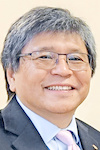
Sheldon Arakaki
I read the Pacific Citizen because it tells the never-ending story of Japanese Americans through the lens of the JACL, its members’ activities and actions and the community at large, which supports the organization. There are lessons to be relearned and perhaps ideas about a path forward for JACL’s second century.
One of the newer chapters to this story is the just-concluded 2024 convention in Philadelphia, the largest in-person multigenerational gathering of the JACL membership this year. Members, friends and supporters posted messages, photos and short videos in a variety of social media platforms about JACL’s largest programming event, but the Pacific Citizen staff was there providing comprehensive coverage and capturing the energy of National Council and the excitement of the APIAVote Presidential Town Hall.
The Pacific Citizen was also there to write stories about the people — members we honored for their service at national and district and for community role models who inspire. The convention stories published include the names of those in front of and behind the scenes, the delegates, committee chairs, board members and volunteers.
All of this eventually becomes a part of the Pacific Citizen archives, a rich source of JACL history — especially of its members and their actions set against the backdrop of our nation’s history.
What was JACL and its members doing and thinking in January 1942, the month after Pearl Harbor and the month before EO 9066 in an atmosphere of anxiety, fear and the desire to prove loyalty.
Read Vol. 14, No. 161. National Secretary Mike Masaoka wrote in an essay, “Let this be our vow for 1942: To Serve America.” The Bainbridge Island subcommittee of the Seattle JACL decided to sponsor a defense bond drive not knowing that in a few weeks, they would be the first Japanese American community “evacuated” in spite of this act of patriotism. The winter season saw the first biennial Inter-Mountain District Convention held in Pocatello, where 300 delegates passed one resolution that was probably influenced by Pearl Harbor. Chapter charters were presented to Idaho Falls, Pocatello and Rexburg, Idaho (aka Yellowstone JACL). Chapters launched even greater efforts to increase membership while changes to membership handling were implemented and calls for donations to National JACL were made. This last story could also be 2024.
Next year is the 60th anniversary of the Immigration and Nationality Act of 1965, which transformed Asian America. What did JACL say and do to advocate for this legislation? What did JACLers think about the seven-category preference system, family reunification and immigration-based labor and skill?
Apparently, JACL had representatives at the bill signing. Read about JACL’s civic engagement and policy positions in Vols. 60 and 61. The Pacific Citizen covers the journey, at the top of the fold, from when President Lyndon B. Johnson called on Congress to eliminate the national origins quota system in January to the introduction of legislation in February to the eventual passage by both legislative chambers in August and September.
This and other stories of JACL are about its members engaging with each other in healthy debate, finding common ground, building community and working with partner organizations to create a better America. The Pacific Citizen is there reporting that story for us to learn from today and 30 years from now.
Support the Pacific Citizen’s Spring Campaign and keep the coverage going.
Arakaki is JACL Pacific Northwest District governor and a P.C. Editorial Board member.



